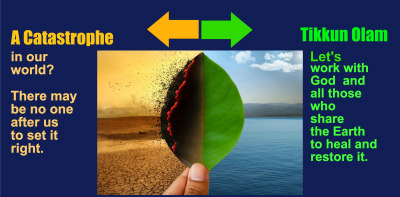Rosh Hashanah Message: Is God’s ‘Very Good’ World Approaching an Unprecedented Catastrophe?
by Richard Schwartz

Rosh Hashanah commemorates God’s creation of the world. The “Ten Days of Repentance” from Rosh Hashanah to Yom Kippur is a period to evaluate our deeds and to do teshuvah (repentance) for cases where we have missed the mark. Sukkot is a holiday in which we leave our fine houses and live in temporary shelters (sukkahs) to commemorate our ancestors’ journey in the wilderness. Hence, the upcoming weeks provide an excellent time to consider the state of the planet’s environment and what we might do to make sure that the world is on a sustainable path.
When God created the world, He was able to say, “It is tov meod (very good).” (Genesis 1:31) Everything was in harmony as God had planned, the waters were clean, and the air was pure. But what must God think about the world today?
What must God think when the rain He provided to nourish our crops is often acid rain, due to the many chemicals emitted into the air by industries and automobiles; when the abundance of species of plants and animals God created are becoming extinct at such an alarming rate in tropical rain forests and other threatened habitats; when the abundant fertile soil God provided is quickly being depleted and eroded; when the climatic conditions God designed to meet our needs are threatened by global warming?
An ancient rabbinic teaching has become all too relevant today:
In the hour when the Holy one, blessed be He, created the first human being, He took him and let him pass before all the trees of the Garden of Eden and said to him: “See my works, how fine and excellent they are! All that I have created, for you have I created them.Think upon this and do not corrupt and destroy My world, For if you destroy it, there is no one to set it right after you.”
Midrash Ecclesiastes Rabbah 7:28
Today’s environmental threats bring to mind the Biblical ten plagues:
* When we consider the threats to our land, water, and air due to pesticides and other chemical pollutants, resource scarcities, acid rain, deforestation, desertification, threats to our climate, etc., we can easily enumerate ten modern “plagues.”
* The Egyptians were subjected to one plague at a time, while the modern plagues threaten us all simultaneously.
* The Israelites in Goshen were spared most of the Biblical plagues, while every person on earth is imperiled by the modern plagues.
* Instead of an ancient Pharaoh’s heart being hardened, our hearts today seem to have been hardened by the greed, materialism, and waste that are at the root of current environmental threats.
* God provided the Biblical plagues to free the Israelites, while today we must apply God’s teachings in order to save ourselves and our precious but imperiled planet.
Today there seems, to be almost daily reports about record heat waves, severe droughts and wildfires, the melting of glaciers and polar ice caps, an increase in the number and severity of hurricanes and other storms, and other effects of climate change. All of the above, and much more, has occurred due to a temperature increase in the past 140 years of a little more than one degree Celsius. So, it is very frightening that climate experts project a temperature increase of 3 to 5 degrees Celsius in the next hundred years. Some leading climate experts believe that self-reinforcing positive feedback loops (vicious cycles) will cause climate change to reach an irreversible tipping point and spin out of control, with disastrous consequences, unless major changes soon occur.
Israel is especially threatened by climate change. A rising Mediterranean Sea could inundate the coastal plain that includes much of Israel’s population and infrastructure. And military experts believe that the hotter and dryer Middle East projected by climate experts will make instability, terrorism, and war more likely.
Fortunately, there are many Jewish teachings that can be applied to shift the earth to a sustainable path. Briefly, these include:
* our mandate to be shomrei adamah (guardians of the earth), based on the admonition that we should “work the earth and guard it” (Genesis 2:15);
* the prohibition of bal tashchit, that we should not waste or unnecessarily destroy anything of value (Deuteronomy 20:19. 20);
* the teaching that,”The earth is the Lord’s and the fullness thereof” (Psalms 24:1), and that the assigned role of the Jewish people is to enhance the world as “partners of God in the work of creation.” (Shabbat 10a);
* the ecological lessons of giving us and the environment a rest, related to the Shabbat, sabbatical, and jubilee cycles.
As co-workers with God, charged with the task of being a light unto the nations and accomplishing tikkun olam (healing and restoring the earth), it is essential that Jews take an active role in applying our eternal, sacred values in struggles to reduce climate change, pollution and the waste of natural resources. Based on the central Jewish mandates to work with God in preserving the earth, Jews must work with others for significant changes in society’s economic and production systems, values, and life-styles. So, at the start of this new year, more than ever before, we should seek to reduce our environmental impact. The fate of humanity and of God’s precious earth are at stake, and if we fail to act properly and in time, there may be “no one after us to set it right.”

Got something to say?
You must be logged in to post a comment.